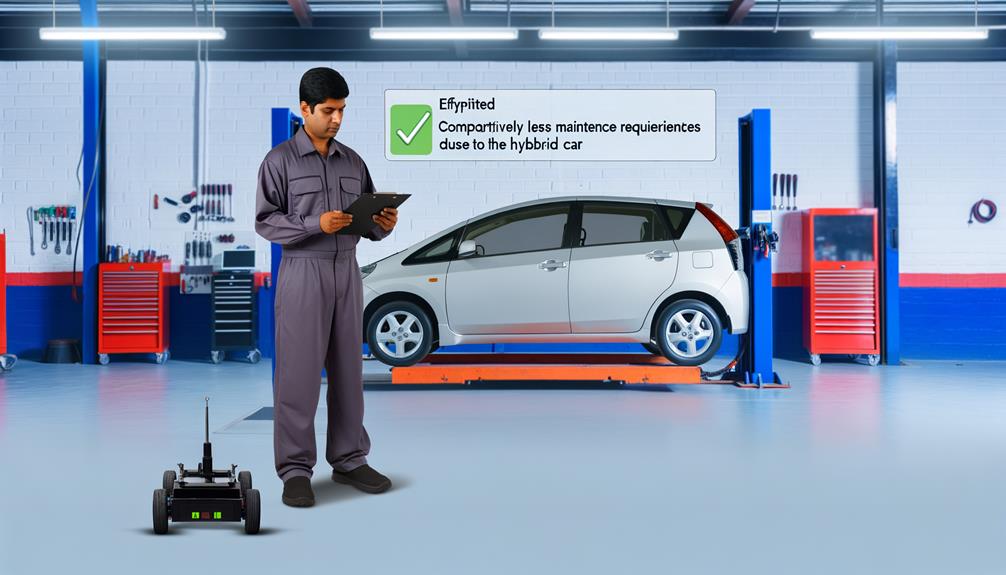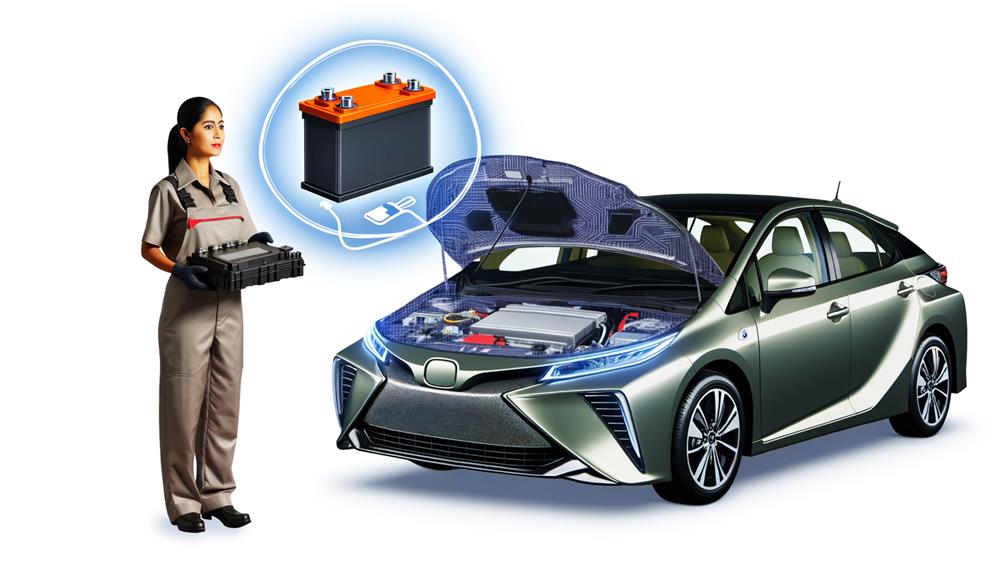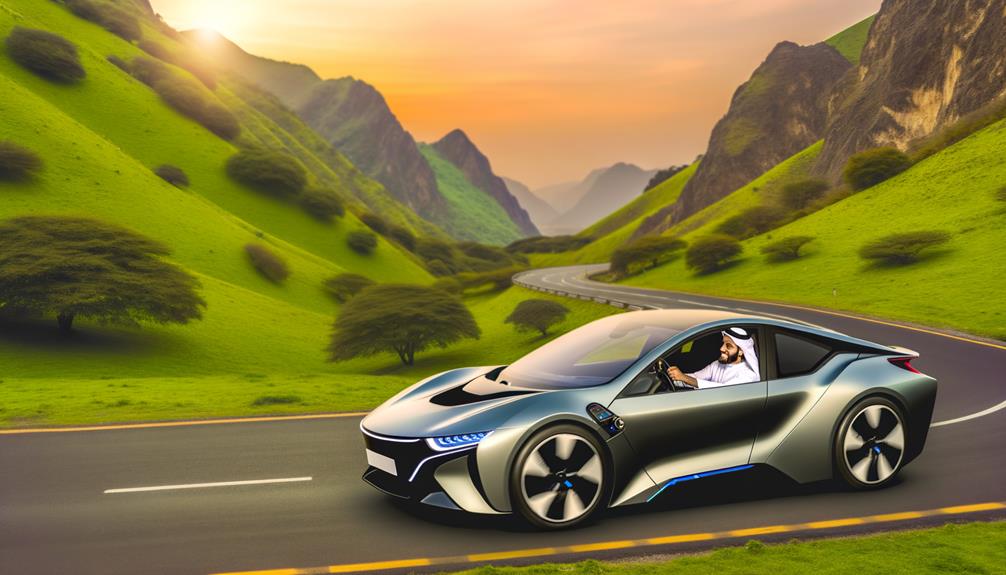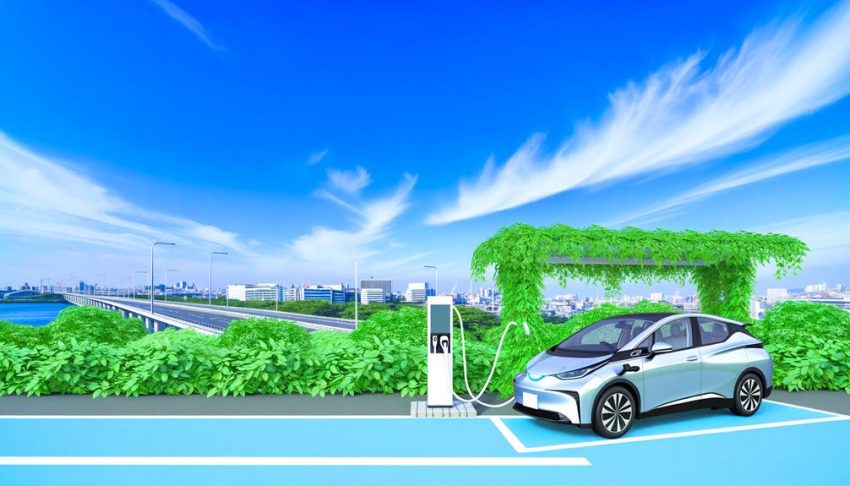You might be wondering if a hybrid car is the right choice for you, considering the buzz around fuel efficiency and environmental benefits. With hybrids often boasting over 50 mpg in the city, they're undeniably attractive for cutting down on fuel costs. Plus, their quieter operation and lower maintenance needs can add to the appeal. However, before you make a decision, it's essential to weigh the initial purchase price and the potential for battery replacement costs. Curious about how these factors stack up against each other? Let's explore more.
Contents
Fuel Efficiency
When contemplating whether to buy a hybrid car, how does fuel efficiency factor into your decision? Hybrid vehicles are well-known for their superior fuel efficiency, often achieving over 50 miles per gallon (mpg) in city driving conditions. This is a stark contrast to standard gas engines, which typically offer lower mpg ratings. For instance, the 2023 Toyota Corolla Hybrid boasts an impressive 53 mpg in the city, compared to just 32 mpg for its gas-only counterpart. This significant difference in fuel economy can result in considerable savings at the pump, especially for urban drivers who frequently face stop-and-start traffic.
The enhanced fuel efficiency of hybrid vehicles stems from their dual powertrains, which combine an electric motor with a gas engine. In urban settings, the electric motor takes advantage of regenerative braking—a process that recaptures energy typically lost during braking and stores it in the battery. This feature allows hybrids to maximize their fuel economy by using less gas. Additionally, the electric motor can power the vehicle at low speeds, reducing the reliance on the gas engine, further improving mileage.
Plug-in Hybrids (PHEVs) take fuel efficiency a step further by offering an all-electric driving range of 20 to 40 miles on a full charge. For short commutes or local errands, this can lead to substantial fuel savings, as the gas engine remains off. By considering these factors, you can see how fuel efficiency plays a pivotal role in the appeal of hybrid vehicles, making them a smart choice for cost-conscious and environmentally aware consumers.
Quieter Operation
Hybrid vehicles offer a quieter operation compared to traditional ICE cars, primarily because they rely more on electric motors at low speeds. This results in considerably lower urban noise levels, which is particularly beneficial in city environments. Additionally, the enhanced cabin quietness in hybrids provides a more serene driving experience for both drivers and passengers.
Lower Urban Noise Levels
The hum of daily traffic is a familiar sound in urban settings, but it doesn't have to be. Hybrid cars, with their reduced reliance on traditional internal combustion engines, offer considerably quieter performance, especially during low-speed city driving. Often running on electric power alone in urban conditions, these vehicles minimize noise pollution, contributing to a more serene environment.
Hybrid cars can help lower urban noise levels by switching to electric power during stop-and-go traffic, a common scenario in cities. This reduction in engine noise not only enhances passenger comfort but also positively impacts the broader community. Lower noise pollution can improve the quality of life for urban residents, making neighborhoods quieter and more enjoyable.
Studies have shown that hybrids generally produce less cabin noise compared to their gas-only counterparts. This quieter operation improves passenger comfort, making for a more pleasant driving experience. By choosing a hybrid vehicle, you're not just opting for greater fuel efficiency and lower emissions, but also contributing to a reduction in urban noise levels. This choice supports a quieter, more peaceful urban environment, benefiting everyone who shares the roads and streets.
Enhanced Cabin Quietness
Lower urban noise levels can indeed transform the atmosphere of a bustling city, but the benefits extend beyond the streets and into the vehicle itself. Hybrid vehicles, particularly during low-speed city driving, often operate with the engine off, resulting in markedly quieter operation compared to traditional gas-only counterparts. This reduction in engine noise not only enhances the driving experience but also contributes to a more serene cabin environment.
The quieter operation of hybrids plays an essential role in minimizing noise pollution in urban environments. By relying less on gas engines, hybrids reduce the overall noise footprint, making city life more pleasant. For passengers, this means an enhanced cabin experience with lower noise levels, increasing comfort during commutes and long drives.
| Feature | Hybrid Vehicles | Gas-only Counterparts |
|---|---|---|
| Noise Levels (Low Speed) | Markedly Quieter | Higher Engine Noise |
| Cabin Comfort | Enhanced | Standard |
| Urban Noise Pollution | Reduced | Higher |
Choosing a hybrid not only benefits the environment but also offers a quieter, more comfortable driving experience. For those prioritizing a peaceful atmosphere, the enhanced cabin quietness of hybrids makes them a compelling choice over gas-only counterparts.
Lower Regular Maintenance

Imagine cutting down on those frequent trips to the mechanic. That's one of the notable advantages of owning a hybrid vehicle. When it comes to lower regular maintenance, hybrid cars stand out for several reasons.
First, hybrid vehicles often require fewer oil changes compared to traditional gas-powered vehicles. This is due to optimized engine designs that enhance efficiency and reduce wear and tear. Here's how you benefit:
- Extended Oil Change Intervals: Hybrid cars typically need oil changes less frequently, which translates to lower regular maintenance and reduced hybrid costs.
- Regenerative Braking System: This innovative feature reduces wear on brake components, meaning your brakes last longer and you save on replacement costs. Over time, this can considerably lower your repairs and maintenance expenses.
- Hybrid Battery Warranties: Many automakers provide warranties for hybrid batteries up to 8 years or 100,000 miles. This offers peace of mind and protects you from unexpected maintenance costs related to the battery.
Moreover, maintenance costs for hybrids are generally lower over their lifespan compared to gas-powered vehicles. This is partly because the regenerative braking system lessens the strain on brake pads and rotors, leading to fewer replacements.
While some consumable parts like tires and filters in hybrid models might have similar replacement rates to those in internal combustion engine (ICE) vehicles, the overall wear is often reduced. This results in notable fuel savings and lower hybrid costs over time.
In essence, hybrid vehicles not only offer environmental benefits but also promise lower regular maintenance and reduced overall costs, making them a wise choice for the cost-conscious and eco-conscious driver alike.
Resale Value
While the benefits of lower maintenance costs are compelling, another significant factor to contemplate is the resale value of hybrid vehicles. When considering a hybrid car, it's important to understand how its worth holds up over time, particularly compared to traditional gas-powered vehicles.
The average list price of used hybrid vehicles is $30,231, which is significantly higher than the $29,642 average for gas-powered vehicles. This indicates a better resale value for hybrids. The increased market demand for fuel-efficient hybrids plays a substantial role in driving these higher resale prices. When you factor in these better resale prices, they can help offset the higher initial purchase costs often associated with hybrids.
Hybrids are known for maintaining their value well, largely due to the growing trend toward fuel efficiency and environmental consciousness. This trend boosts their desirability in the used car market, resulting in better selling prices compared to traditional internal combustion engine vehicles. For you, this translates to a significant impact on overall ownership satisfaction, as the higher resale value can make the total cost of ownership more attractive in the long run.
The reputation of hybrids for fuel efficiency and lower emissions further supports their desirability on the resale market. This enhances their long-term financial viability, ensuring that when you decide to sell your hybrid, it will likely command a premium price. Essentially, choosing a hybrid car can be a smart financial decision, offering not just savings on fuel and maintenance but also a strong resale value, contributing positively to your long-term financial strategy.
Battery Replacement Costs

Understanding the potential battery replacement costs is vital when evaluating the long-term financial implications of owning a hybrid car. Hybrid vehicles typically require a main battery pack replacement around 150,000 miles or after approximately 15 years of use. These replacement costs can be significant, often exceeding $3,000 and sometimes reaching up to $5,000. This expense can, in certain cases, surpass the vehicle's remaining value, which is an important consideration for long-term ownership.
Several factors influence the timing and necessity of a battery replacement:
- Battery Wear and Age: Hybrid batteries generally have low failure rates since they aren't deeply cycled like those in fully electric vehicles. However, over time, wear and age will necessitate replacement.
- Automaker Warranties: Many automakers offer warranties on hybrid batteries, commonly covering around 8 years or 100,000 miles. These warranties can provide peace of mind and mitigate concerns about replacement costs for new buyers.
- Overall Cost-Benefit Analysis: When considering a hybrid vehicle, it's important to factor in the potential expense of battery replacement as part of your overall cost-benefit analysis. Long-term ownership should account for this significant cost to guarantee you're making a financially sound decision.
While the upfront cost of replacing a hybrid battery may seem intimidating, the lower failure rates and extended warranties provided by automakers can alleviate some of the financial burden. By understanding these replacement costs and incorporating them into your overall cost-benefit analysis, you can make a more informed decision about whether a hybrid vehicle aligns with your long-term financial goals.
City Vs. Highway MPG
When considering a hybrid car, you should evaluate how your driving patterns align with the vehicle's strengths. Hybrids shine in city driving, achieving impressive mpg figures due to their ability to efficiently handle stop-and-start traffic. However, their highway performance often lags, as the gas engine predominates at higher speeds, making the mpg benefits less pronounced.
Urban Efficiency Benefits
Hybrid vehicles offer considerable advantages in urban environments, particularly due to their exceptional fuel efficiency. When it comes to city mileage, hybrid vehicles greatly outperform gas-only models. For instance, the 2023 Toyota Corolla Hybrid achieves an impressive 53 mpg in the city, whereas traditional gas-only models often reach just 32 mpg. This superior fuel efficiency is most pronounced during stop-and-start driving conditions, which are typical in urban settings.
Urban driving benefits from the hybrid powertrain's ability to seamlessly switch between electric and gasoline engines. Here's why hybrids shine in city environments:
- Stop-and-Start Efficiency: Hybrids excel during frequent stops and starts, utilizing electric power to minimize fuel consumption.
- Reduced Emissions: With less reliance on the gas engine, hybrids produce fewer emissions, contributing to cleaner urban air.
- Lower Fuel Costs: Higher city mileage translates to fewer trips to the pump, saving you money over time.
While hybrids may not offer the same benefits during highway performance, their urban efficiency makes them ideal for city dwellers. If your daily commute involves maneuvering through congested streets, a hybrid could be the perfect choice for maximizing fuel efficiency and minimizing environmental impact.
Highway Performance Limits
While hybrid vehicles excel in urban settings, their highway performance often reveals certain limitations. Hybrid vehicles typically achieve their best fuel efficiency in city driving conditions, where the frequent stop-and-start scenarios enable the electric motor to operate more frequently. For instance, the 2023 Toyota Corolla Hybrid achieves an impressive city mpg of 53, but its highway mpg drops to 32, underscoring the disparity in performance based on the driving context.
The efficiency advantages of hybrids are curtailed on highways. The internal combustion engine takes over more often during sustained high speeds, reducing the contribution of the electric motor and thereby diminishing overall fuel efficiency. This contrasts with city driving, where the electric motor's utilization leads to significant miles per gallon improvements.
| Vehicle Model | City MPG | Highway MPG |
|---|---|---|
| Toyota Corolla Hybrid | 53 | 32 |
| Honda Insight | 55 | 49 |
| Ford Fusion Hybrid | 43 | 41 |
While hybrids offer substantial benefits in urban environments, their highway performance is less impressive compared to traditional gas-only vehicles. Thus, understanding the driving context is essential when considering a hybrid vehicle, as the fuel efficiency gains are mainly realized in city settings.
Driving Condition Variability
Considering the limitations of hybrids on highways, it's important to understand how driving conditions affect fuel efficiency. Hybrid vehicles excel in city driving due to their ability to maximize fuel efficiency in stop-and-go traffic. For instance, the 2023 Toyota Corolla Hybrid achieves up to 53 mpg in city driving, while its gas-only counterpart manages only around 32 mpg. This stark contrast highlights the significant fuel savings possible in urban environments.
However, during highway driving, the advantages of hybrid powertrains diminish. The constant higher speeds typical of highway driving reduce the mpg ratings of hybrid vehicles, often resulting in lower fuel efficiency compared to city driving. While a hybrid might still outperform a conventional vehicle on the highway, the difference isn't as pronounced as in city conditions.
When deciding if a hybrid is right for you, consider these points:
- City Driving: Hybrids provide exceptional fuel efficiency in urban areas, making them ideal for city driving.
- Highway Driving: Fuel efficiency gains are less impressive on highways, leading to lower mpg ratings.
- Driving Patterns: Assess your driving patterns; if you primarily drive in stop-and-go traffic, a hybrid offers substantial fuel savings.
Understanding these variabilities guarantees you choose a vehicle that aligns with your driving needs.
Driving Experience

Many drivers find that the driving experience in hybrid vehicles can be quite different from traditional internal combustion engine (ICE) cars. Hybrid vehicles prioritize fuel efficiency, which often results in a perception of a less engaging driving experience. This can be particularly true for enthusiasts who crave the thrill of acceleration and sharp handling. However, the driving experience in hybrids offers unique advantages such as instant torque from the electric motor, leading to smoother acceleration at low speeds.
| Feature | Hybrid Vehicles | Traditional ICE Cars |
|---|---|---|
| Driving Feel | Subdued, prioritizes fuel efficiency | Engaging, prioritizes performance |
| Acceleration | Smoother, instant torque from electric motor | More abrupt, relies on gas engine alone |
| Noise Levels | Quieter, especially at low speeds | Louder, consistent engine noise |
| Speed Handling | Electric motor at low speeds, gas engine for high speeds | Gas engine operates continuously |
Hybrids like the Porsche and Toyota RAV4 Prime are exceptions, delivering a more dynamic driving feel. Yet, most hybrid vehicles typically offer a subdued driving experience. The combination of an electric motor for low speeds and a gas engine for higher speeds and hill climbing can feel less responsive compared to traditional ICE cars. This dual power source can sometimes make hybrids feel less connected to the road.
On the upside, many hybrids achieve a quieter ride, particularly at lower speeds, due to reduced reliance on the gas engine. This can make for a more serene driving experience, appealing to those who value cabin tranquility.
Frequently Asked Questions
What Is the Downside to a Hybrid Car?
Hybrid cars have higher battery replacement costs, maintenance concerns, and insurance premiums. They often face towing capacity limitations, driving experience differences, and possible resale value issues. Additionally, there's an ongoing environmental impact debate regarding their overall sustainability.
Are Hybrid Cars Worth Buying?
Hybrid cars are worth buying due to their superior fuel efficiency, positive environmental impact, and lower maintenance costs. They offer high resale value, advanced technology features, and government incentives, enhancing the overall driving experience and long-term investment.
Do You Actually Save Money With a Hybrid Car?
Yes, you actually save money with a hybrid car. Higher fuel efficiency, lower maintenance costs, tax incentives, and potentially higher resale value offset the initial cost. Plus, you'll enjoy a quieter driving experience and positive environmental impact despite battery lifespan concerns.
Is It Better to Buy a Hybrid or Gas Car?
When deciding between a hybrid and gas car, consider fuel efficiency, environmental impact, maintenance costs, and resale value. Hybrids offer advanced technology features and tax incentives, but your driving experience may vary depending on your typical driving conditions.
Conclusion
To summarize, buying a hybrid car offers numerous advantages in fuel efficiency, quieter operation, and lower regular maintenance, translating to substantial long-term savings. Hybrids also maintain higher resale values, enhancing their financial appeal. However, consider the initial costs and potential battery replacement expenses. While city driving maximizes fuel benefits, highway mileage may vary. Ultimately, if you're seeking a balance of eco-friendliness, cost-effectiveness, and a comfortable driving experience, a hybrid is a compelling choice.
